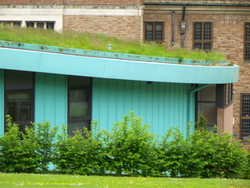
Researchers from the University of Melbourne, Australia have found that glancing for forty seconds out of the office window at a green and grassy rooftop, boosts mental concentration in subjects engaged in relatively boring mental tasks.
A total of 150 students were recruited to undertake such a task in a city office block. The students had to watch a computer screen as a series of numbers flashed up, and for each number press the corresponding key on the keyboard, unless it was the number three. The students were given a 40-second break in the middle of the task, where they were permitted to look at a rooftop scene. Half of the students were randomly assigned to view a green flowering meadow rooftop. For the other half, the view was of a bare concrete roof.
The results revealed that after their microbreak, the students who glanced at the grassy rooftop made significantly fewer mistakes and showed better concentration in the second half of the task, compared with those who viewed the concrete rooftop.
Lead author of the study, Dr. Kate Lee, says it shows that just looking at an image of nature for under a minute can help us perform tasks more effectively. “We know that green roofs are great for the environment, but now we can say that they boost attention too.” Dr Lee emphasizes the importance of microbreaks – short and informal breaks that happen spontaneously throughout the day: “It’s something that a lot of us do naturally when we’re stressed or mentally fatigued. There’s a reason you look out the window and seek nature; it can help you concentrate on your work and to maintain performance across the workday.”
In 2014, the University of Exeter Medical School recommended more green spaces in towns and cities as they can bring lasting benefit to public health. Following the health of 1000 people for 5 years, the Exeter researchers found not only that moving to a greener area improved participants’ mental health, but also that the benefit lasted long afterwards.
(Journal of Environmental Psychology, June 2015. http://www.sciencedirect.com/science/article/pii/S0272494415000328 and http://medicine.exeter.ac.uk/news/title_349054_en.html)
